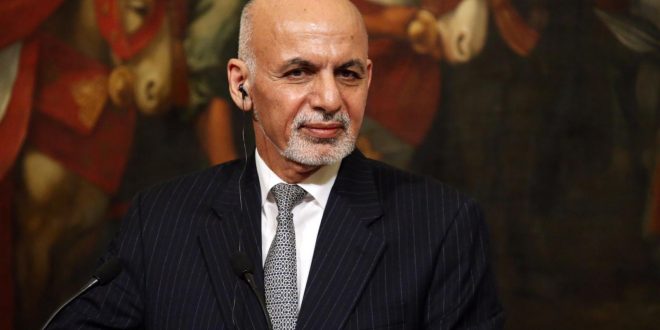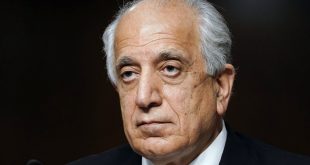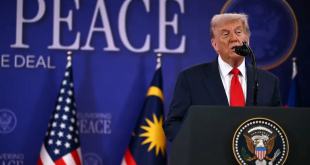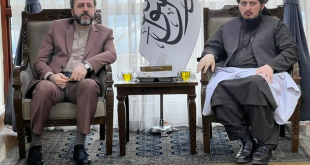By Elenoire Laudieri
The 18th century Italian philosopher, Giambattista Vico, postulated that history repeats itself. One century later Karl Marx added that, when it does, it first become as tragedy and then a farce.
Marx’s suggestion might come true in Afghanistan, aside from the fact that farce would precede tragedy. Should the U.S decide to pull out its troops from Afghanistan taking it on trust that the Taliban will renounce terrorism and embrace democracy, it would be a repeat of what happened in Europe in 1938 when Britain and France signed a peace agreement with Nazi Germany. We know what happened a few months later.
An end of the presence of American and NATO troops in Afghanistan is surely a goal to be pursued but not at the risk of frustrating what has been achieved at a high cost in terms of human losses and financial aid. Since overthrowing the Taliban regime in 2001, the U.S. have suffered over 2,400 military and 1,700 civilian deaths and some 20,000 troops wounded. Much higher losses have been incurred by the Afghan people with 45,000 soldiers and civilians killed by Taliban insurgents.
The financial cost of U.S. involvement in Afghanistan is estimated in well over one trillion dollars not counting the costs beard by NATO Allies and partners whose troops today exceed in total those of the Americans although their mission is not to combat but to train, advise and assist the Afghan forces who since 2014 are in charge of the security of their country.
It’s hardly conceivable that U.S. administration would throw away all of this and jeopardize the democratic system and institutions they have spent 17 years protecting including the implementation of women’s and civil rights.
A troops withdrawal now that the Taliban are desperately trying to gain control of the Afghan regional territory, would be equal to a cop out. The urgency and ruthlessness that characterize the Taliban attacks are directly proportional to the effectiveness of the current government in securing the democratic and economic development of the country.
Since he took office in 2014, President Ghani has been overseeing a reform process that has produced positive changes to public administration and the management of resources.
During the ten-year presidency of his predecessor, Afghanistan had essentially remained embedded in an amalgam of influential constituencies, warlords and tribal elders who exercised political power to their self-interest.The post-2001 political order had bred government-sponsored overlords and corrupt patronage networks that in exchange of their support for the government were granted funds drained from foreign subsidies that were meant to boost the Afghan economy and to lift the impoverished population out of extreme poverty.
With a Phd in anthropology and a distinguished academic career, President Ghani is one of the rare cases of a scholar risen to the top office of a nation. But he is not just a man of letters. Before getting involved with politics, he spent years doing field work for the World Bank and developing strategies on how to create viable institutions in poor countries overrun with corruption and violence. He devoted particular attention to countries that were in no position to enforce laws, establish a market economy, levying taxes, provide welfare services or keep citizens safe. From this experience he gained a deep understanding of cultural and ethnic differences and learned how people’s perspectives, beliefs and practices can be channelld into a wider social, political and economic context which is crucial in today’s globalised world.
When he became president, Ashraf Ghani set himself to dismantle the shady system he inherited from the previous administration and to make sure that public money would be spent in a productive and transparent way, but he soon had to deal with a dramatic economic downturn. After the decision by the U.S. government to drastically cut down the American troops deployed in Afghanistan, the economy collapsed, unemployment soared, and hundreds of thousands of Afghans abandoned the country. Nonetheless he was ready to face the situation.
A book titled “Fixing Failed States: A Framework for Rebuilding a Fractured World.” that he had written a few years earlier with a British human-rights lawyer and his long-time collaborator Clare Lockhart, and a three-hundred page work plan “Continuity and Change” that he had used as his campaign manifesto guided his reformist agenda.
He was also prepared for the massive reductions of American troops as the year prior to his election he had been in charge of preparing Afghanistan for such scenario and the handover of military authority to the Afghan Army. This unpaid job had allowed him to travel around the country, meeting provincial governors, security corps officers and district police chiefs. The experience had reinforced his conviction of the people’s yearning for reform.
He began to implement his plan in all government sectors and institutions. He sent into forced retirement a hundred generals who had been skimming money from troop contracts. He ordered the resignations of all governors and cabinet ministers and announced that nobody who had served in those capacities could do so again. He also fired forty top prosecutors who had falsified their CVs. He reviewed the portfolios of every international donor agency and every week he chaired a committee on procurement and spent several hours reviewing contracts to ensure that they represented clean government. He believed that straightening out government practices was the precondition for improving the economic and social well-being of the people.
Today, as his term as president is drawing to a close, Ghani has gained the support of many of his countrymen so much so that, despite the growing antagonism from the old guard politicians and frustrated power brokers, he has announced his intention to run for a second term later this year.
There is a lot to be done to fully develop the economy of Afghanistan considering its abundant natural resources and its fertile farmlands. However, thanks to the reforms introduced during President Ghani’s first term of office, the Afghan economy is well set to expand its export market and attract new foreign investments. Last year alone saw the signing of more than $500 million in investments contracts. Afghanistan GDP is expected to grow in the coming years from the current 2.5 to 4 percent.
As far as the fight against terrorism is concerned, it is not a problem that can be settled with an imprudent peace treaty with the Taliban. Even assuming that they were genuinely seeking a peaceful settlement, the Taliban are just one of the twenty groups classified as terrorist by U.S. and the United Nations operating in Afghanistan.
As President Ghani pointed out in a speech he recently pronounced at the annual Munich Security Conference, there is no precedent for dealing with terrorism peacefully. “These are not civil wars” he explained. “When you have twenty terrorist groups from all over the world, how do you deal? How do you make peace with them? Civil wars are inherently political disagreements about the direction of the future and about how to exercise power. With terrorist groups, what is the conversation? How is the conversation to be held?”
These questions linger over the negotiations that the U.S. are conducting with the Taliban and are most unlikely to find a plausible answer. Believing in the good intentions of a terrorist organization that killed tens of thousands of their own people would be a farce that would soon turn into a tragedy.
Elenoire Laudieri is a sinologist and a strategic analyst in Asian Affairs and a regular contributor to Chinese and international publications
 Afghanistan Times Latest News and Analysis from Afghanistan and the Region
Afghanistan Times Latest News and Analysis from Afghanistan and the Region




